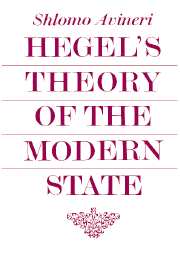Book contents
- Frontmatter
- Contents
- Title in the Series
- Preface
- 1 Beginnings
- 2 Positivity and Freedom
- 3 The Modernization of Germany
- 4 The New Era
- 5 Modern Life and Social Reality
- 6 The Owl of Minerva and the Critical Mind
- 7 The Political Economy of Modern Society
- 8 Social Classes, Representation and Pluralism
- 9 The State – the Consciousness of Freedom
- 10 War
- 11 The English Reform Bill – the Social Problem Again
- 12 History – the Progress towards the Consciousness of Freedom
- Epilogue
- Bibliography
- Index
10 - War
Published online by Cambridge University Press: 05 June 2012
- Frontmatter
- Contents
- Title in the Series
- Preface
- 1 Beginnings
- 2 Positivity and Freedom
- 3 The Modernization of Germany
- 4 The New Era
- 5 Modern Life and Social Reality
- 6 The Owl of Minerva and the Critical Mind
- 7 The Political Economy of Modern Society
- 8 Social Classes, Representation and Pluralism
- 9 The State – the Consciousness of Freedom
- 10 War
- 11 The English Reform Bill – the Social Problem Again
- 12 History – the Progress towards the Consciousness of Freedom
- Epilogue
- Bibliography
- Index
Summary
Hegel's theory of war led various commentators to find a connection between Hegelian political theory and the fascist, totalitarian ideas about war and the state. There is no doubt that what Hegel has to say on the subject of war is rather unusual and sometimes quite startling, and it is easy to see how his unorthodox views, when taken out of the context of his general political philosophy, could have been so misconstrued.
Nothing could be more unsettling than the way in which Hegel criticizes the conventional wisdom about war, derived from the heritage of Natural Law theories. This heritage, both in its ecclesiastical and its secular version, tended to look upon war as something deviating from the norm of peace and harmony unless war was waged for what could be declared to be a ‘just’ cause. Since the avowed aim of Natural Law theories was to achieve a system of harmonious cooperation among individuals as well as among states, a strong undercurrent of negative value judgement accompanied anything deemed to be injurious to this effort. War, or strife generally, always meant, therefore, that something went wrong.
This left Natural Law theories with somewhat Manichean explanations about the origins and causes of war. A theological Natural Law theory could always refer either to God's inscrutability, or to man's fall, or to both; secular theories had no such convenient refuge, and thus had no choice but to acknowledge the chasm between the ‘is’ and the ‘ought’. The legacy of this dichotomy is, of course, strongly felt in Kant as well.
- Type
- Chapter
- Information
- Hegel's Theory of the Modern State , pp. 194 - 207Publisher: Cambridge University PressPrint publication year: 1972
- 1
- Cited by

